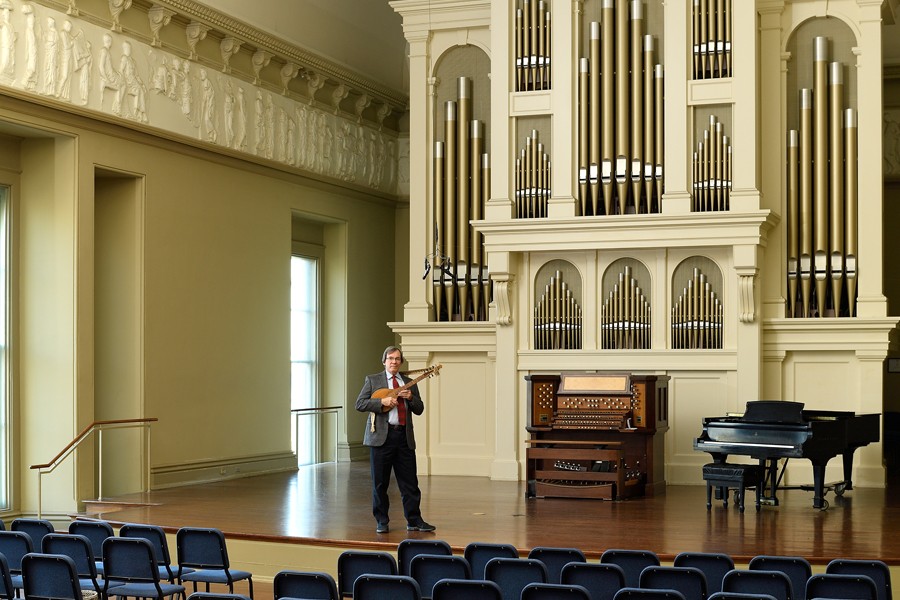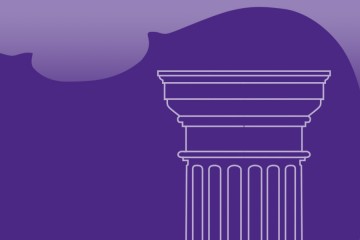Multi-instrumentalist Mark Cudek uses music to travel back in time. As a veteran early music performer and chair of the Peabody Conservatory's Historical Performance Department, he's been playing and teaching since the late 1970s music that predates the late-18th-century emergence of what we call "classical" music. And with a pair of upcoming concerts, Cudek, the Baltimore Baroque Band, and the Peabody Renaissance Ensemble—which is celebrating its 30th season this year—are turning to music that's half a millennium old.
The "In Dulci Jubilo: A Reformation Christmas" concerts celebrate the quincentennial of the Protestant Reformation, when theologian Martin Luther objected to, among many things, the Roman Catholic Church's practice of selling forgiveness for sin through indulgences. This defiance sparked a Christian reform movement that produced the breakoff churches we see today, but as recent articles in The Guardian and The New York Times point out, Luther was also a musician and composer. And because sacred music often echoed the Catholic decadence that Luther criticized, the reformation of church practices extended to church music.
Throughout the Christian world, Reformed churches caused composers to rethink music, in some ways making it more accessible to everyday people. "The complex Latin polyphonic music of composers like Josquin des Prez, a favorite of Martin Luther, gives way to a simpler hymnlike music written in various vernacular languages," Cudek says. "The Lutheran Reformation, however, gives us a satisfying body of music that is both complex and virtuosic yet based on folk like 'chorale' melodies everyone in church would be able to sing," he says. "By the 16th century, many of these melodies were in the oral tradition, and Luther even composed some of his own. Some melodies—such as 'In Dulci Jubilo: Good Christian Men, Rejoice'—are the basis for modern day Christmas carols that are still sung today."
Michael Praetorius, the composer featured in the first half of the concert, wrote hundreds of pieces based on these tunes, including chorale concertos scored for vocal soloists, a small string orchestra, and choir. "These simple tunes are also the inspiration for much of Bach's music, a century later," Cudek says. The Peabody Renaissance Ensemble will be presenting four of Praetorius' chorale concertos, a few simpler hymnlike settings, dances of contemporary composers Hans Leo Hassler and Johann Herman Schein, and a couple of Luther's tunes unadorned.
A number of early instruments from Peabody's collection will be featured. Students will play stringed instruments such as the viola da gamba, harp, guitar, and lute. Wind instruments include recorders and Renaissance flutes, "which were simple tubes of wood with seven holes in them—six to put your fingers on, and one to blow through," Cudek says. Alumnus William Simms will be featured on Renaissance lute in the first half and on theorbo in the second.
Praetorius, Hassler, and Schein are among the composers who span the Reformation's immediate aftermath, from the Renaissance into the early baroque era. The second half of the concert includes baroque pieces by Dieterich Buxtehude, Johann Christoph Pez, and Georg Philipp Telemann performed by the Baltimore Baroque Band—Peabody's baroque orchestra—co-directed by John Moran and Risa Browder and featuring soprano Katelyn Aungst and recorder players JT Mitchell and Sarah Lynn.
"For the general audience, a program like this is eye-opening, with the variety of styles and instruments from the Renaissance and baroque periods," Cudek says. And for the conservatory student, whose classical education typically begins with Johann Sebastian Bach, hearing and studying music from the Reformation era open their ears to Western music's deep reservoir. "Conservatory students realize that these tunes that Bach used in his cantatas go back way before Bach," Cudek says, "so there's a broadening of their scope of music history." Such is how concerts complement students' music training, exposing them to composers, instruments, and ideas that not only continue to inform classical music today but to transfix it 500 years after it was first played and heard.
Cudek knows from experience. He was a rock 'n' roll guitar player during his high school years in the 1960s, an experience that spurred an interest in acoustic, finger-picking guitar. He became a classical guitar student at SUNY Buffalo, and "by the end of my undergraduate career, probably half the repertoire I was playing was originally lute music that was transcribed for the guitar," he says. "That's the music that I fell in love with and the reason I came to Peabody, to do graduate work on the Renaissance lute."
The Baltimore Baroque Band and the Peabody Renaissance Ensemble perform "In Dulci Jubilo: A Reformation Christmas" at 7:30 p.m. on Dec. 8 at the Church of the Redeemer, a benefit for the food bank at Paul's Place, and at 4 p.m. on Dec. 10 at Peabody's Griswold Hall.
Additional upcoming Peabody events (all are free and open to the public)
Peabody Children's Chorus performs an afternoon program featuring pieces by Johannes Brahms, Benjamin Britten, and Gustav Holst; Appalachian, Irish, and Scottish folk songs; and more on Dec. 3 in Peabody's Friedberg Hall.
The New Yorker classical music critic Alex Ross delivers a pair of free talks, about Richard Wagner on Dec. 5 in Gilman Hall on the Homewood campus, and on "Composers, Critics, and the Weight of the Past" on Dec. 6 in Peabody's Cohen-Davison Family Theatre.
Conductor Edward Polochick leads the Peabody Symphony Orchestra, the Peabody-Hopkins Chorus, and the Peabody Singers through Joseph Haydn's Mass in B-flat major and Brahms' Symphony No. 4 on Dec. 5 in Peabody's Friedberg Hall.
The Peabody Brass Band performs on Dec. 7 in Peabody's Griswold Hall.
The winter Junior Bach concert, where new pieces written by students from the St. Ignatius Loyola Academy in partnership with Peabody composition students are debuted, takes place on Dec. 8 in Peabody's Goodwin Recital Hall.
Kay Redfield Jamison, the Dalio Professor in Mood Disorders at the Johns Hopkins School of Medicine, leads a panel discussion on mood disorders and creativity at the university's George Peabody Library, followed by a performance of Peabody faculty composer Michael Hersh's Carrion-Miles to Purgatory—13 pieces after texts of Robert Lowell for violin and cello on Dec. 8 in Peabody's Friedberg Hall.
The Peabody Wind Orchestra & Wind Band performs works by Scott Joplin, Wagner, and Vaughan Williams on Dec. 16 in Peabody's Friedberg Hall.
Posted in News+Info, Benefits+Perks, Happenings
Tagged music + museums + more









